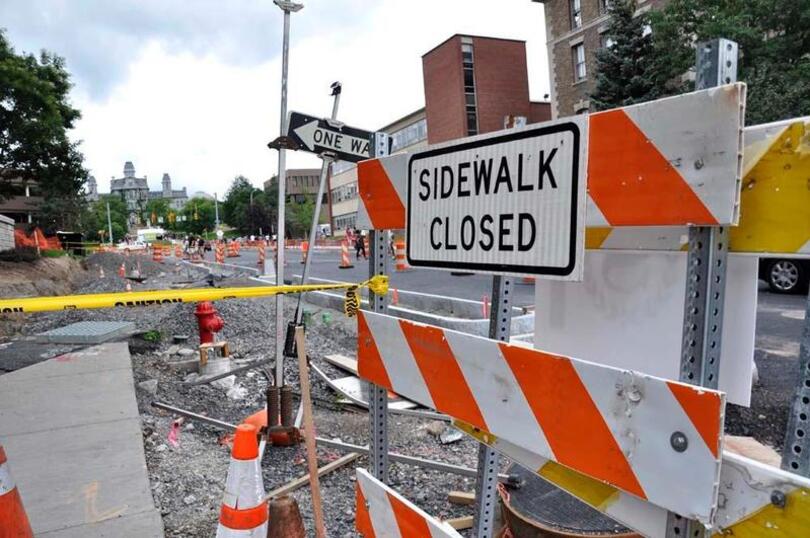Leaders celebrate completion of Connective Corridor road construction

Construction of the second phase of the Syracuse Connective Corridor has been completed. The construction aims to improve the link between Syracuse University and downtown Syracuse. Daily Orange File Photo
Road construction along the Connective Corridor is complete.
At a ceremony Wednesday at the Central New York Community Foundation in downtown Syracuse, local, state and federal leaders celebrated the completion of the construction. As a ceremonial end to the construction, commemorative pavers were laid in front of Fayette Firefighters Park.
Construction of the Connective Corridor, which is a partnership between Syracuse University, the city and Onondaga County, included bike lanes and the development of a bus line connecting downtown with the University Hill area. The project also included the development of an initiative that collects water to help alleviate storm water runoff.
“From its inception, the Connective Corridor offered a vision for all revitalization initiatives to follow: connecting neighborhoods to foster an economic and cultural revival throughout the city of Syracuse,” said Sen. Chuck Schumer (D-N.Y.). “Linking University Hill and Downtown Syracuse has already enhanced the flow of people and ideas between the two areas and I have no doubt that will continue now that the project is complete.”
The Connective Corridor was one of former SU Chancellor Nancy Cantor’s major initiatives when she was chancellor from 2004 to 2013. Cantor proposed the $47 million project in 2005. Current Chancellor Kent Syverud has cited a continued commitment to the Connective Corridor.
Funding for the project came from a variety of sources, including $10 million from the grant program Transportation Investment Generating Economic Recovery grant, which Schumer helped get, and $20 million secured from New York state by Assemblyman Bill Magnarelli (D-Syracuse).
More than 1,320 students and 76 faculty members have been involved in the Connective Corridor, Interim Vice Chancellor and Provost Liz Liddy said on Wednesday.
“The Corridor has been a living lab where students gain real-world experience, produce portfolio work and make connections that foster more engaged alumni who are more likely to become community and global leaders,” Liddy said.
The Corridor had more than 187,000 riders last year, according to a press release from Syracuse Mayor Stephanie Miner’s office.
“What the Connective Corridor demonstrates is that infrastructure begets growth and that our economy will thrive when we make investments in our future,” Miner said.
The ceremony marked the conclusion of phases one and two of the project. Phase three includes projects along the Civic Strip, which will include a major lighting project.




